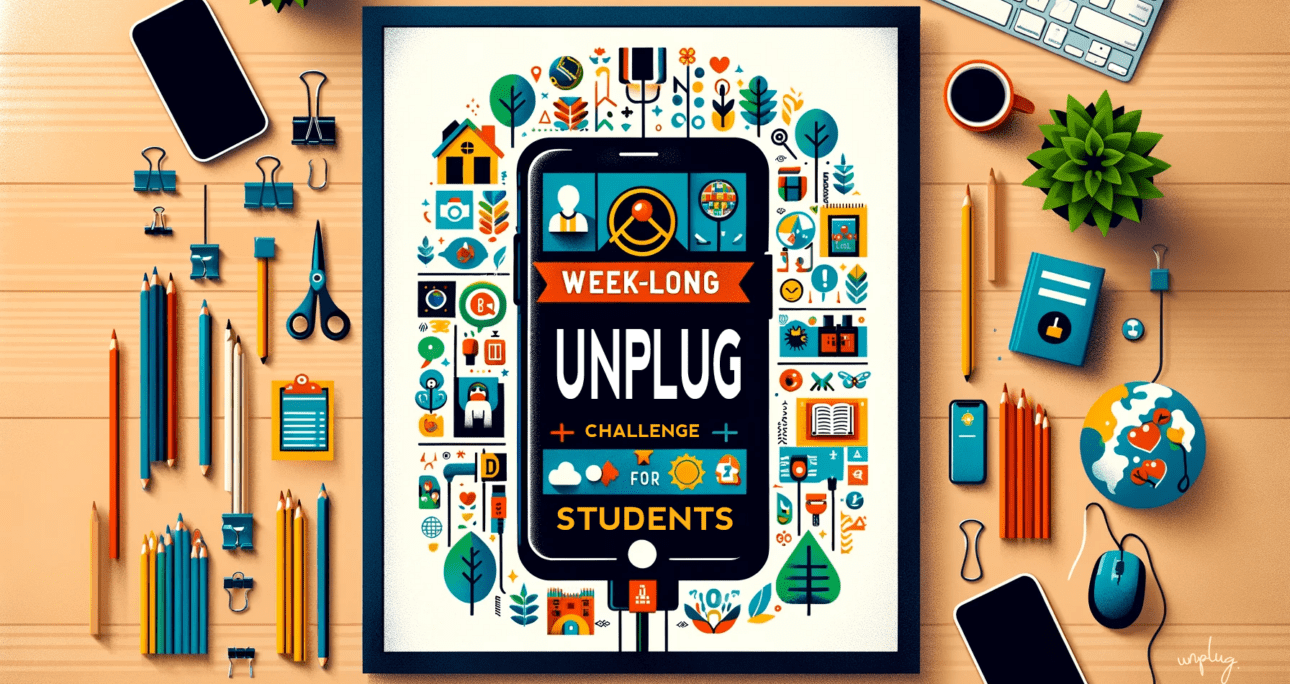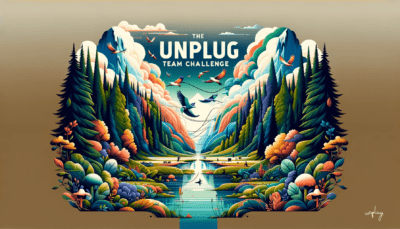We are all aware of the challenges our teachers face in today’s world, with every student carrying a mobile phone with them everywhere they go. Rather than creating a combative relationship between students and teachers over the use of technology, we’ve designed a curriculum that will allow teachers to incorporate micro-unplugging into their classroom assignments.
Creating a week-long student challenge involving school and home activities can encourage mindfulness, creativity, and family engagement. Here’s a list of challenges students can choose from, each designed to be completed within half an hour. The points for each challenge are allocated based on the perceived difficulty, effort, or impact of the activity.
Week-Long Challenge List for Students
- Digital Detox Walk (10 Points): Take a 30-minute walk outside without any digital devices. Observe nature, the architecture of your neighborhood, or simply the sounds around you. Write a short paragraph about your experience or draw something you saw.
- Family Interview (15 Points): Interview a family member about their favorite childhood game or activity that didn’t involve technology. Learn how to play this game or engage in this activity together.
- Cook a Family Recipe (20 Points): With the help of a family member, cook a traditional family recipe. Document the process through drawings or written steps and share the story behind the recipe with your class.
- Create a Handmade Thank You Card (10 Points): Make a handmade thank you card for someone in your school or community. Explain why you’re thankful for them. Extra points for creativity!
- Read a Book Aloud (15 Points): Spend 30 minutes reading a book aloud to a family member or friend. Choose a book that you can both enjoy and discuss what you read afterward.
- Nature Scavenger Hunt (20 Points): Participate in a nature scavenger hunt with a family member in a local park or your backyard. Make a list of items to find in nature, take pictures or draw them, and share your findings with the class.
- No-Screen Entertainment Night (20 Points): Organize an evening of entertainment without screens for your family. This could include board games, storytelling, or a DIY craft project. Share your family’s experience and what you learned from it.
- Map My Day (10 Points): Create a hand-drawn map of your day, from waking up to going to bed, highlighting non-digital activities. Present your map to the class, explaining the most enjoyable parts of your day.
- Gratitude Journal (15 Points): Keep a gratitude journal for a week. Each day, write down three things you’re grateful for that don’t involve technology. Share some of your entries with the class at the end of the week.
- DIY Science Experiment (15 Points): Conduct a simple science experiment at home using everyday materials. Document the hypothesis, process, and results in a creative way to share with your class.
Bonus Unplug Project Challenges
For the Week-Long Unplug Challenge for students, here are 10 bonus point options that teachers can offer to encourage further engagement and creativity. These options are designed to deepen the impact of the challenge and promote values such as mindfulness, empathy, environmental awareness, and community involvement.
- Community Service (10 Bonus Points): Participate in a community service project without using digital devices. This could be a neighborhood clean-up, helping at a local shelter, or assisting elderly neighbors.
- Star Gazing Night (5 Bonus Points): Spend an evening stargazing with your family. Document the constellations you identify together and share any stories or myths you learn about them.
- Plant a Tree (10 Bonus Points): Plant a tree with your family or school. Learn about the type of tree you’re planting and why it’s beneficial for the environment. Document the planting process.
- Visit a Museum (10 Bonus Points): Visit a museum with your family and learn about a topic or exhibit without using digital guides. Create a handmade brochure or drawing about your favorite exhibit.
- Write a Letter to a Pen Pal (5 Bonus Points): Write a handwritten letter to a pen pal in another country or state. Share about your life and ask about theirs. Discuss the experience of writing and receiving handwritten letters.
- Family History Project (10 Bonus Points): Conduct a family history project. Interview family members about your ancestry and create a family tree or storybook without using online resources.
- Handmade Gift Exchange (5 Bonus Points): Organize a handmade gift exchange with your classmates. Create gifts that require thought, time, and creativity instead of purchasing something.
- Outdoor Adventure Challenge (10 Bonus Points): Embark on an outdoor adventure with your family, such as a hike, bike ride, or kayaking. Document the journey with a written diary or sketches.
- Mindfulness and Meditation (5 Bonus Points): Practice mindfulness or meditation for a week. Keep a journal of your experience, noting any changes in your stress levels, focus, or overall well-being.
- Create a No-Tech Game (5 Bonus Points): Invent a no-tech game that can be played indoors or outdoors. Teach the game to your class or family and explain the rules and objectives.
These bonus point options are designed to not only complement the core challenges but also to enrich the students’ experiences, offering diverse ways to connect with themselves, their families, and their communities.
Implementation Notes
- Total Points: Students can earn up to 100 points by selecting a combination of these challenges.
- Documentation: Encourage students to document their experiences either through writing, drawing, or taking photos (if appropriate and not against the challenge rules).
- Classroom Sharing: Allocate time for students to share their experiences and what they learned from the challenges. This can foster a sense of community and encourage reflection.
Feel free to adjust the point values or the nature of the challenges to fit better your students’ age, interests, and context.





